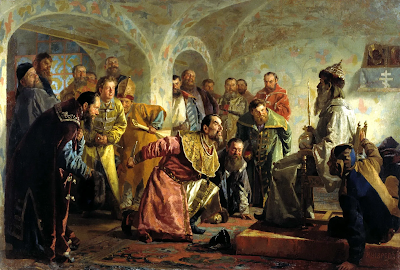Book review: Day of the Oprichnik, 16 Years Later
'This rhythm in Russia, of repression and violent revolution, is well known to Sorokin, who first emerged as a writer under Soviet rule in the 1980s, when he was no less irritating to the Kremlin. He’s not just a satirist but also a speculative fantasist, and he became angrily political after Putin came to power. Day of the Oprichnik has almost nothing in common with the earnest Soviet protest novel echoed in its title, Aleksandr Solzhenitsyn’s masterful One Day in the Life of Ivan Denisovich; instead it’s a fierce political cartoon painted in lashing strokes. Putin himself has been erased from this fictional world, but the pointed humor will be apparent to any Russian...'
IN HIS SARCASTIC NOVEL Day of the Oprichnik (translated by Jamey Gambrell), Vladimir Sorokin imagines a wealthy, dominant, ultra-modern but revanchist Russia in the distant Year of Our Lord 2028. A tsar-like monarch has been restored, Communism is remembered as a time of the “Red Troubles”; Red Square, in fact, has been painted white. His Majesty’s inner circle consists of about a dozen gleefully amoral oligarchs who kill on Kremlin command. The term for these men, oprichniki, will carry a Russian reader back to the bloody rule of Ivan the Terrible (1547–84), when an oprichnik was a member of the vast royal guard, a group of loyalists who terrorized Russian civilians on horseback, with severed dogs’ heads attached to their saddles to evoke the hounds of hell.
Day of the Oprichnik. By Vladimir Sorokin
Reviewed by MICHAEL SCOTT MOORE
Sorokin wanted to imagine what Russia might become if the country’s future was determined by its staunchest traditionalists and reactionaries—especially the political philosopher Aleksandr Dugin, but also Vladimir Putin, who was still a newish president when the novel appeared in 2006. The invasion of Ukraine is the most savage and lurid expression so far of both men’s political visions, and with every official excuse for the war, every irrational justification, Putin and his people seem to reveal a little more of their Duginist fantasy. Putin has dismissed the idea of Ukrainian nationhood; he likes to remind his public of earlier centuries of Russian imperialism, and his foreign minister Sergei Lavrov has even said the current war will mark the end of the American “uni-polar world,” a particular obsession of Dugin’s. With all that in the foreground, it’s worth considering what Sorokin was up to more than fifteen years ago....
Day of the Oprichnik. By Vladimir Sorokin
Reviewed by MICHAEL SCOTT MOORE
Sorokin wanted to imagine what Russia might become if the country’s future was determined by its staunchest traditionalists and reactionaries—especially the political philosopher Aleksandr Dugin, but also Vladimir Putin, who was still a newish president when the novel appeared in 2006. The invasion of Ukraine is the most savage and lurid expression so far of both men’s political visions, and with every official excuse for the war, every irrational justification, Putin and his people seem to reveal a little more of their Duginist fantasy. Putin has dismissed the idea of Ukrainian nationhood; he likes to remind his public of earlier centuries of Russian imperialism, and his foreign minister Sergei Lavrov has even said the current war will mark the end of the American “uni-polar world,” a particular obsession of Dugin’s. With all that in the foreground, it’s worth considering what Sorokin was up to more than fifteen years ago....

